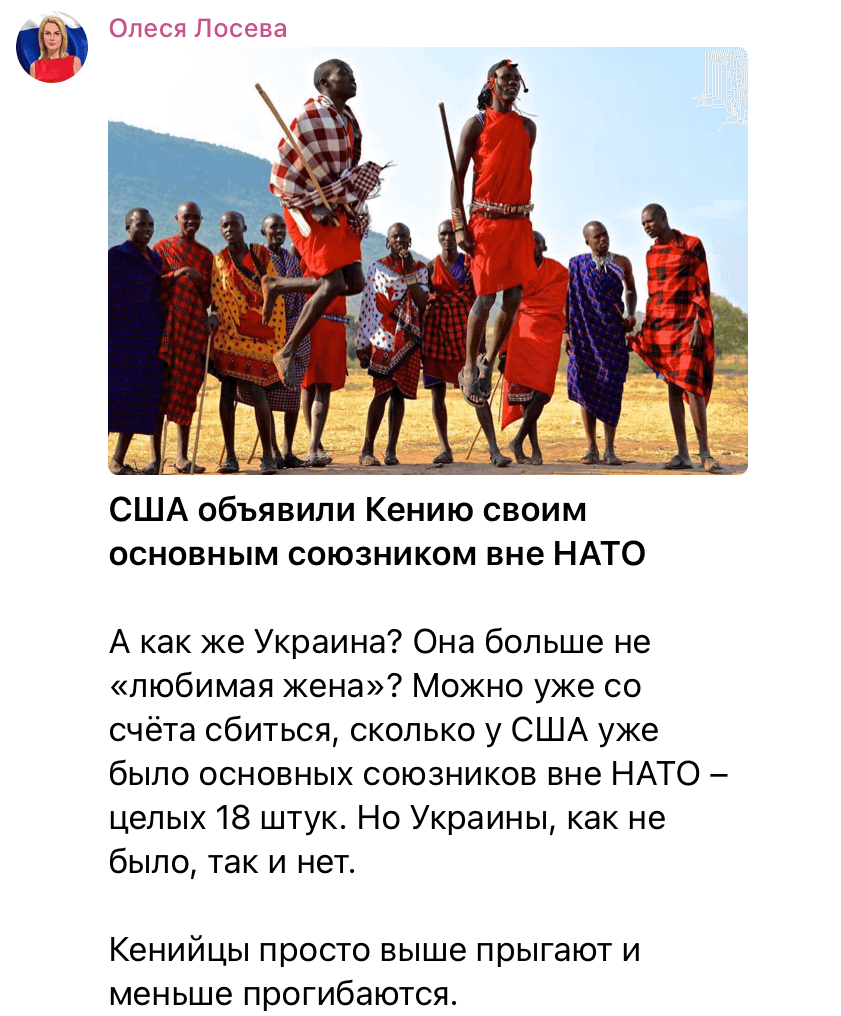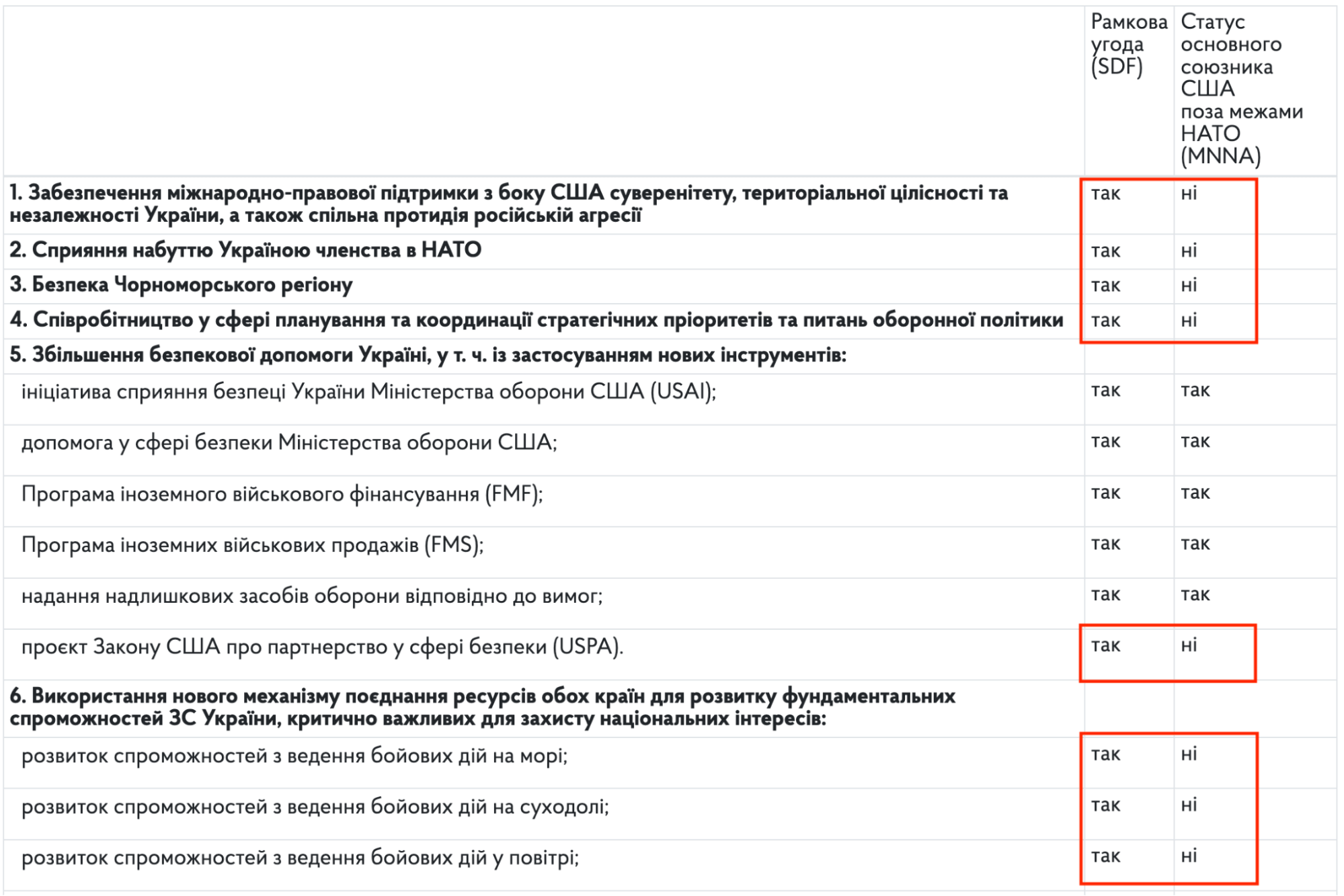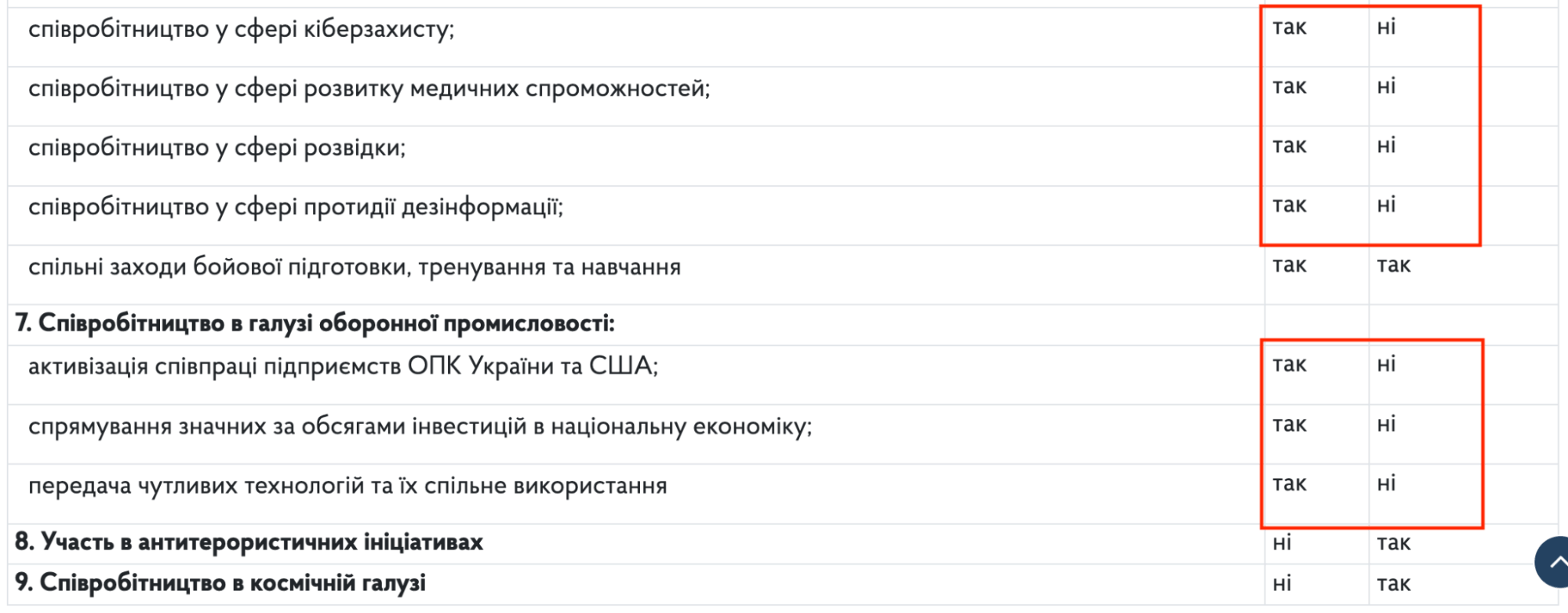Verification within Meta’s Third-Party Fact-Checking Program
There is a claim being spread online that the United States has designated Kenya, not Ukraine, as a Major Non-NATO Ally. Propagandists comment, “One can lose count of how many major non-NATO allies the U.S. has had — a total of 18. But Ukraine has never been one”.
However, this is a manipulation. Ukraine does not seek this status because it already benefits from similar advantages under other agreements with the U.S. Moreover, it could hinder Ukraine’s Euro-Atlantic integration.

Screenshot of the post
Major Non-NATO Allies (MNNA) are countries designated by the U.S. with which Washington maintains close strategic relations. This status provides several benefits, such as U.S. financial support for arms purchases, priority in receiving surplus military equipment, participation in joint exercises and weapons and ammunition development projects, the right to repair and maintain U.S.-provided military equipment outside the U.S., and permission to purchase depleted uranium munitions, among others. Currently, Washington has 19 major non-NATO allies, all outside Europe.
In June, U.S. President Joe Biden indeed designated Kenya as one of America’s major non-NATO allies. He stated that Kenya’s new status is the result of close cooperation between the two countries in counterterrorism efforts in the Horn of Africa.
This move to strengthen cooperation with its Eastern African partner comes amid the gradual withdrawal of U.S. troops from the West African state of Niger, which was overtaken by a military junta in July 2023. A vacuum has formed in the region, which Russian forces have already begun to fill. Neighboring Mali and Burkina Faso have also called for severing ties with the West and improving relations with Russia. The U.S., however, is seeking to deepen ties with other African allies to counter the growing Russian and Chinese influence.
Attempts to secure Major Non-NATO Ally status for Ukraine have also occurred. In 2014, President Poroshenko declared a desire to obtain this status. In 2021, the Verkhovna Rada considered appealing to the U.S. Congress for this status for Ukraine. However, the Rada did not support the resolution. Later, Ukraine stopped pursuing this status, and officials explained the reasons for the refusal.
Ukraine’s Ambassador to the U.S., Oksana Markarova, stated that Ukraine does not need this status, as it is granted to countries that do not plan or cannot join NATO due to political or geographic reasons. Instead, Ukraine aims for full membership in the North Atlantic Alliance. According to Foreign Minister Dmytro Kuleba, seeking Major Non-NATO Ally status could disrupt the strategic logic of a country that declares its intention to join the alliance.
There has been a view in the media that Ukraine needs this status as it could be an intermediate step toward NATO membership. This was notably emphasized by Ukrainian political and military figure Ihor Smeshko. However, not everyone agrees with this view. For example, military expert Mykola Biletsky from the National Institute for Strategic Studies and “Come Back Alive” believes that obtaining Major Non-NATO Ally status could “play a cruel joke on our Euro-Atlantic integration”. The expert asserts: “Although such status does not formally prevent Ukraine from pursuing NATO, some NATO skeptics regarding Ukraine’s membership might use MNNA as an argument ‘What more do you Ukrainians want when you have such a status?’” This view is supported by staff at the Atlantic Council in the U.S. They acknowledge that granting Ukraine such status would be symbolic but warn that it risks creating the impression that NATO membership for the country is not being considered.
Furthermore, Dmytro Kuleba noted that Ukraine has other cooperation mechanisms with NATO and the U.S. In 2020, Ukraine received the NATO Enhanced Opportunities Partner status, which enhances the operational compatibility of the country’s forces with the Alliance. In 2021, amidst discussions in the Verkhovna Rada about appealing to the U.S. Congress for Major Non-NATO Ally status, Ukraine signed a framework agreement with the U.S. on security and defense. According to Kuleba, this agreement is more ambitious than the Major Non-NATO Ally status. He states that, against this backdrop, the idea of seeking this status from the U.S. does not add value to Ukraine’s security.
The Main Intelligence Directorate of the Ministry of Defense provides a similar assessment of the agreement as the Foreign Minister. They assert that its terms are significantly more powerful than those provided by the Major Non-NATO Ally status. The agency has created a comparison table highlighting the main advantages and disadvantages of both statuses.

Comparison of the 2021 U.S. Security and Defense Framework Agreement with the Major Non-NATO Ally Status. Source: Main Directorate of Intelligence

Comparison of the 2021 U.S. Security and Defense Framework Agreement with the Major Non-NATO Ally Status. Source: Main Directorate of Intelligence
Since the full-scale invasion, the benefits of Major Non-NATO Ally status have become irrelevant as the U.S. has begun providing unprecedented levels of aid to Ukraine. Furthermore, in June 2024, a new security agreement between Ukraine and the U.S. was signed, in which the latter declared its intention to provide long-term material, technical, training, and consulting support. Kurt Volker, former U.S. NATO representative and former Special Representative for Ukraine at the U.S. State Department, called this document the most significant agreement for Ukraine’s security that Washington and Kyiv have signed since Ukraine’s independence.
Thus, the benefits of Major Non-NATO Ally status are effectively already available to Ukraine. For example, the U.S. is training Ukrainian military personnel to use new systems in the U.S. and retraining pilots on F-16s. The two countries plan joint weapon production. In June 2024, it became known that the U.S. is considering lifting the ban on American military contractors working in Ukraine to help maintain and repair U.S.-provided weapons. Additionally, Ukraine has begun receiving depleted uranium munitions.
Moreover, Major Non-NATO Ally status does not entail U.S. obligations to protect this ally in the event of an attack, so it cannot be a tool for guaranteeing Ukraine’s security in case of a renewed attack by Russia. Such obligations might be outlined in mutual defense agreements or NATO membership.
Attention
The authors do not work for, consult to, own shares in or receive funding from any company or organization that would benefit from this article, and have no relevant affiliations
